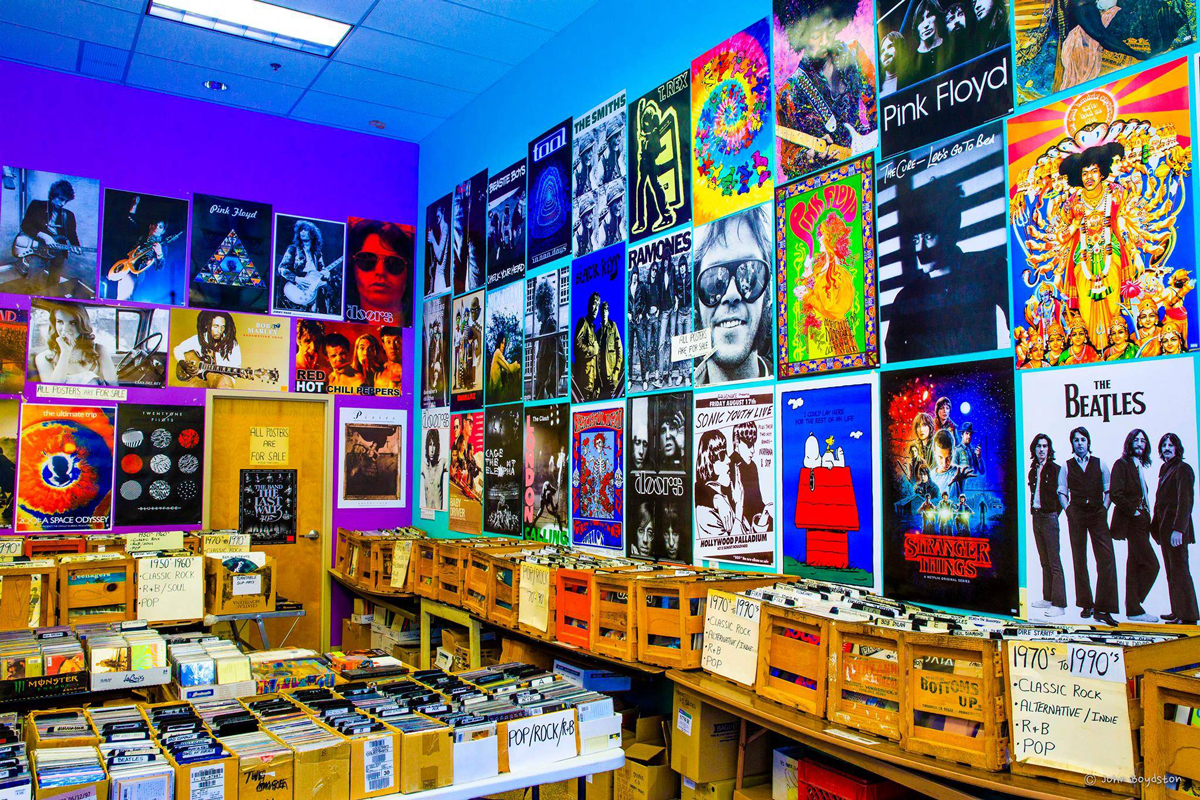
Photograph by John Boydston
I didn’t have a record player back in the early ’90s. But the first word in the name of the shop on Peachtree Road, in Garden Hills, was enough to make an 11-year-old kid beg his mom to pull over and let him wander around inside: Fantasyland Records. It didn’t really belong in broader Buckhead—that much I grasped even then. It didn’t belong to any world I knew as a relatively sheltered sixth grader living in Ansley Park and attending private school. The walls were covered in posters celebrating the counterculture and its hallowed icons. The tables were crammed with crates with handwritten labels stuck to them: Delta blues, prog rock, acid jazz. What in the world, I wondered, was acid jazz? I’d find out.
The aesthetic of Fantasyland became the aesthetic of my childhood bedroom: on one wall, Hendrix setting his guitar on fire; on another, Morrison posing mischievously for Annie Leibovitz; Kerouac and Cassady sitting together above my bookshelf; Che staring defiantly at me—and anyone else who dared to glance his way—from a closet door. Rebellion without context, to be sure. An unearned sneer settled on my baby face. Still, these posters offered a view into other worlds, where I’d eventually wander.
Fantasyland Records was founded 50 years ago by a South Carolinian named Andy Folio. He’d started it as a comic book shop—the original name reflected this—but one day he brought in a box of records gathering dust in his home and offered them for three bucks each. Before long, records made up 90 percent of Folio’s sales. He stocked what would ultimately amount to more than 50,000 of them: LPs, 45s, 12-inch singles. A rare Beatles printing once sold for $2,300, the all-time store record for a single album. He also added compact discs—which I had the equipment to play in the ’90s—along with DVDs and other forms of physical media (including plastic-encased Playboy magazines tucked in a back corner, which I eyed but never ventured into). Folio has said that Fantasyland, which moved to Pharr Road in 2010, should really be called “the House of Obsolete Media.”
Technically, it is. But like Videodrome on North Highland Avenue, Fantasyland is a commercial and cultural anachronism that has survived—so far—because it serves a vital need that technology cannot adequately meet: community. When I texted some childhood friends about the place the other day, I immediately got half a dozen responses. Most were elegiac. “In losing these places,” one friend wrote, “we lose these gathering points and communities and rituals that once brought so much joy.”
But Fantasyland is still here. I wandered in recently and soon found myself talking with two strangers about the Cameron Crowe film Almost Famous. They couldn’t remember the name of the fictional band that the plot follows. I did: Stillwater. Next thing I knew, one of them was inviting me to a record convention in Stone Mountain that weekend. (I started collecting in my 20s.) The other pointed out a record of Jimmy Carter’s best speeches. In the end, I settled on Aja by Steely Dan. Twelve bucks. There, ready to ring me up, was Mark Gunter, the same man who sold me all my posters long ago. He was just as reticent as I remembered him, but grayer. “I remember you,” I said. “Welcome back,” he told me.
This article appears in our April 2025 issue.
Advertisement




